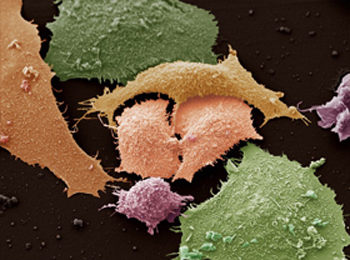
Source: Lung Cancer Cells, Wellcome Library

Source: Lung Cancer Cells, Wellcome Library
Most scientists believe that cancers occur due to mutations in the cell. But where do the mutations come from? Approximately 10% of cancers are thought to be inherited. Most cancers are due to environmental conditions. There are many carcinogens, substances that cause cancer, in our everyday environment. Take a look at the various factors around you that can contribute to you developing cancer:
A. Diet and Weight: Generally speaking, the more weight you carry, the more likely you are to develop cancer. Certain diets contribute to cancers, too. A diet that contains a lot of red meat has been linked to the development of prostate cancer. Some preservatives/additives and food colorings have also been linked to other cancers.
Use this website to learn more:
American Institute for Cancer Research
B. Sun Exposure: The ultraviolet (UV) radiation in sunlight is the major cause of skin cancer. Exposure to UV rays doesn't just come from the sun. Artificial tanning beds may be even more dangerous. "A new study shows that indoor ultraviolet (UV) tanners are 74% more likely to develop melanoma (skin cancer) than those who have never tanned indoors."
Read more about these statistics from the website:
Skin Cancer Foundation: Tanning
C. Tobacco Use: Lung cancer is the leading cause of cancer deaths in the United States. The astonishing thing is lung cancer is preventable! Nearly all cases of lung cancer are due to smoking. Smoking is not the only way tobacco contributes to cancer, though. Chewing tobacco and snuff can cause cancer of the tongue, cheek and gums.
For more statistics about lung cancer:
Center for Disease Control: Lung Cancer Statistics
D. Viruses: Some viruses like the human papillomavirus (HPV) contribute to cancer formation. HPV is strongly linked to the formation of cervical cancer.